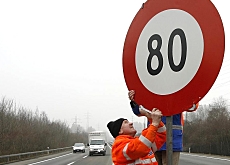
Debate heats up over persistent winter smog

Switzerland's regional authorities remain at odds over controversial measures to combat high air pollution levels.
Motorists appear to heed the lower speed limits introduced on Saturday in about half of the country’s 26 cantons.
Twelve cantonal authorities along the motorways in northern and central Switzerland agreed to reduce permitted speed limits from 120 kilometres per hour to 80kmh.
The measure is expected to remain in force for up to eight days.
It is not clear whether other cantons, particularly in western, eastern and southern Switzerland, will follow suit.
The restrictions were generally accepted by motorists, police said on Saturday.
However, politicians continue to debate the merits of the speed limits.
It was time to take action, primarily for public health reasons, said Hanspeter Uster, a member of the Zug cantonal government who had led the campaign.
He admitted that speed limits were not the answer to everything.
Symbolic action
But Willy Haag, a member of the St Gallen cantonal government, dismissed the measure as a knee-jerk reaction and a merely symbolic gesture.
He called on citizens to take more responsibility and for the federal authorities to step up long-term efforts to reduce pollution by dust particle emissions.
Motoring associations denounced the speed limits as an overreaction.
For their part, environmental groups criticised the authorities for not doing enough and called for the introduction of car-free Sundays and a ban on diesel vehicles without particle filters.
As a high-pressure weather zone persisted in Switerland over the past week, dust particles in many lower-lying areas of the country reached levels well above those permitted.
Federal efforts
On Thursday, the environment minister, Moritz Leuenberger, came out in favour of speed limits in urban centres where pollution was likely to cause most harm.
He said the federal authorities and the cantons would hold talks next week in a bid to coordinate their efforts.
The environment ministry earlier this month proposed a set of measures to reduce levels of diesel emissions and soot.
The Federal Railways and other public transport agencies launched a campaign to encourage drivers to leave their cars at home. They are offering cheap tickets for passengers travelling in Switzerland on Sunday.
swissinfo with agencies
Three million people in Switzerland – more than 40% of the population – live in regions which record above-average fine particle levels.
Permitted level of fine dust particles – Switzerland: 50 micrograms per cubic metre; EU: 50 mcg/m3; US: 150 mcg/m3.
Dust particles cause 3,700 premature deaths a year in Switzerland and annual extra health costs of SFr4.2 billion ($3.4 billion).
The Federal Environment Office says 21,000 tons of fine dust are emitted in Switzerland every year.
37% is caused by the agriculture sector, 29% comes from road, rail and air traffic, 27% from industry and 7% from private households.
56% comes from the private and public use of engines. The rest comes from diesel motors (17%), wood burning (15%), other burning (10%) and petrol, natural gas and natural oil (2%).

In compliance with the JTI standards
More: SWI swissinfo.ch certified by the Journalism Trust Initiative

























You can find an overview of ongoing debates with our journalists here . Please join us!
If you want to start a conversation about a topic raised in this article or want to report factual errors, email us at english@swissinfo.ch.